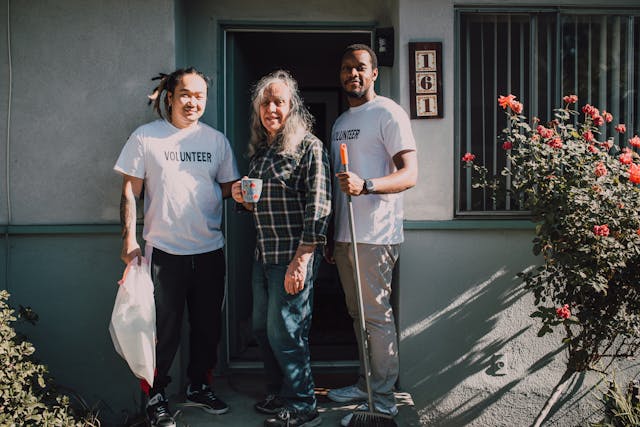Strong communities rely on property managers who understand the value of good neighbor practices. Managing a property is not just about maintenance and rent collection. It’s also about fostering trust, communication, and mutual respect among neighbors, tenants, and owners. With the right approach, property managers can create environments where people feel comfortable, connected, and proud to live.
Communication Builds the Foundation
Clear and consistent communication helps avoid misunderstandings and sets expectations for everyone involved. Tenants and homeowners need to know how to reach property management, where to direct complaints, and what is expected of them to keep the community running smoothly.
Setting up an online portal for tenant inquiries or maintenance requests streamlines communication. This system ensures tenants feel heard and allows property managers to respond promptly. For communities without digital tools, regular office hours or scheduled check-ins work just as well.
A property I once managed implemented quarterly newsletters to keep tenants informed about upcoming maintenance schedules, local events, and community rules. This small effort cut down on complaints and strengthened tenant relationships.
Establishing and Enforcing Clear Rules
Rules keep the peace in shared spaces, but they only work when everyone understands and follows them. Property managers should clearly define community guidelines covering noise levels, parking, trash disposal, and the use of shared amenities like pools or fitness centers.

Enforcing rules consistently shows that everyone is treated equally, preventing resentment from building among tenants or homeowners. Exceptions or uneven enforcement erodes trust and creates tension within the community.
One building I managed faced frequent disputes over unassigned parking spaces. After introducing a clearly marked parking system and issuing permits, conflicts dropped significantly, and tenants appreciated the fair approach.
Proactive Maintenance and Cleanliness
A clean and well-maintained property not only looks good but also shows tenants and homeowners that management values the community. Common areas like hallways, gardens, and parking lots require regular attention to prevent wear and tear.
Scheduling routine inspections helps identify issues before they escalate. A leaking faucet or cracked sidewalk may seem small, but addressing these issues quickly builds trust and ensures the property remains safe and attractive.
During one particularly rainy season, a community I managed experienced severe drainage issues. Acting swiftly to install proper gutters and redirect water flow not only solved the problem but also prevented potential long-term damage, saving the owners thousands in repairs.
Resolving Conflicts Effectively
Conflicts are inevitable when people live close together, but how these disputes are handled makes all the difference. Property managers play a critical role in mediating disagreements, whether it’s between tenants, neighbors, or even tenants and management.
Listening to all sides without bias establishes trust. Documenting complaints and actions taken ensures transparency and fairness in the process. When disputes arise, setting up a meeting or offering a neutral space to discuss the issue often resolves matters quickly.
One tenant in a building I oversaw consistently complained about noise from a neighbor’s late-night gatherings. After a respectful discussion with both parties, the neighbor agreed to keep the volume down during certain hours, and the complaints stopped. Approaching the issue diplomatically kept both tenants satisfied without unnecessary tension.
Supporting Community Events
Communities thrive when neighbors know and care for each other. Hosting social events like holiday gatherings, potlucks, or clean-up days encourages tenants to interact and build relationships. These events also give property managers a chance to engage directly with residents in a relaxed setting.
A community I managed organized an annual summer barbecue where tenants could meet their neighbors and share concerns or ideas with management. Attendance grew each year, and tenants often cited the event as one of their favorite things about the property.
Even smaller gestures, like leaving welcome packages for new tenants, help foster a sense of belonging and appreciation.
Emphasizing Safety and Security
Feeling safe in one’s home is non-negotiable. Property managers must prioritize security measures that protect both people and property. Installing outdoor lighting, maintaining secure locks, and regularly inspecting alarm systems are simple ways to enhance safety.
In larger communities, hiring security personnel or implementing surveillance cameras may be necessary. Regularly communicating safety protocols and providing emergency contact information ensures tenants know what to do if an issue arises.
During a period of rising car break-ins in one neighborhood I managed, installing additional lighting and hiring a night patrol significantly reduced incidents. Tenants expressed relief, and the improved security reinforced their trust in management.
Encouraging Sustainable Practices
Green initiatives not only benefit the environment but also foster a sense of responsibility and community pride. Encouraging recycling, conserving energy, and maintaining eco-friendly landscaping sets a positive example and aligns with growing tenant demand for sustainable living options.
Installing recycling bins, using energy-efficient lighting in common areas, or planting native, low-water plants are practical starting points. Educating tenants on these efforts builds buy-in and increases participation.
A community I worked with installed bike racks to promote greener transportation. Tenants responded enthusiastically, and the addition became a selling point for prospective renters.
Being Present and Accessible
A visible and approachable property manager reassures tenants and homeowners that their concerns matter. Regular on-site visits provide an opportunity to check on the property, interact with residents, and spot potential issues before they’re reported.
When management becomes invisible, tenants may feel neglected or unsupported. Being present at least part-time, even in larger communities, helps maintain relationships and prevent small concerns from escalating.
One tenant described their satisfaction with management as directly tied to the fact that I was “always around to help” when needed. Sometimes, simply showing up makes all the difference.
Taking Feedback Seriously
Listening to tenant and homeowner feedback is one of the simplest ways to strengthen a community. Suggestion boxes, surveys, or one-on-one conversations provide valuable insights into what residents value or want improved.

Making changes based on feedback—whether it’s adding bike racks, improving Wi-Fi, or addressing a specific maintenance issue—shows tenants that management values their opinions.
In one case, I managed a property where tenants consistently complained about poor laundry facilities. Upgrading the machines not only resolved the issue but also improved tenant retention, as many were considering moving due to the inconvenience.
Long-Term Commitment to Improvement
Building a strong community is an ongoing process. Property managers who commit to consistently improving the property and addressing tenant needs create environments where people want to stay. High retention rates reduce turnover costs and foster a sense of stability for all residents.
Communities that feel cared for by management often reflect that care in how tenants treat their neighbors and the property itself. Good neighbor property management isn’t just about rules and repairs—it’s about creating a space where everyone feels respected, valued, and secure.
